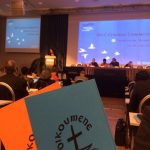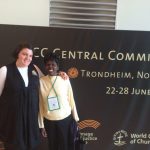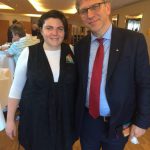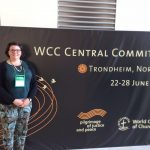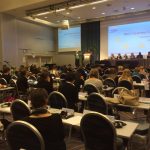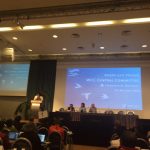The Uniting Church will be represented by a youthful voice at the World Council of Churches (WCC) with the election of Emily Evans to the WCC Executive Committee.
The Executive Committee is the top governance body of the WCC and implements strategic objectives set by the Central Committee. It meets twice a year and oversees council finances, monitors ongoing program work and appoints leadership staff.
Emily was one of 11 new members elected to the Executive Committee at a meeting in Trondheim, Norway in June. She has worked with the Uniting Church Synod of Victoria and Tasmania’s Justice and International Mission unit and has been a member of the WCC gender advisory group. She was elected to the Central Committee in 2013 and is on the WCC’s ECHOS Commission, which consists of 20 young Christians involved in the ecumenical movement.
During the week-long meeting, the Central Committee approved a range of reports and decisions. These included statements on the global refugee crisis, the human rights situation in West Papua and a call for prayer following the recent Brexit vote. As a relative newcomer to the international ecumenical movement, Emily hopes to achieve greater understanding of the role and responsibility of the WCC.
“This includes learning about the lives and lived experience of other member churches, gaining a deeper understanding of what true Christian unity means in the world today and bringing back to the UCA new learnings and insights,” she explained.
“Under their quota system of membership, I tick multiple boxes – I am young, I am a woman, I am lay and from the ‘Asian region’. With this background I hope to bring a new and fresh insight to the life and processes of the WCC.”
The WCC is a fellowship of 348 member churches that collectively represent more than half a billion Christians throughout the world. It brings together churches and denominations in more than 110 countries and territories.
Emily believes the Uniting Church has plenty to offer to the global Christian unity movement given it was born out of the union of three denominations.
“The Uniting Church in Australia brings to the WCC practical and lived experience of what it means to be living out Christian unity. Even though I was born post-Union and all I have known is the Uniting Church, I acknowledge the journey that led us to Union,” she said.
“The UCA lives out a practical desire for dialogue with other Christian denominations and traditions. Through UnitingWorld, we have active engagement and partnership with our partner churches around the world.”
Despite being a relative young church, the Uniting Church in Australia has offered significant contributions to the WCC. In 2005, the WCC examined its decision-making process and former Uniting Church president Rev Dr D’Arcy Wood suggested the UCA consensus approach. The WCC agreed to adopt the consensus model and now uses orange and blue cards to facilitate decisions.
The Uniting Church is also represented by members on the WCC commissions. Rev Dr Morag Logan, convener of the Assembly Christian Unity Working Group, is vice-moderator of the Faith and Order Commission while Rev Elenie Poulos, national director of UnitingJustice Australia, is involved in the Commission of the Churches on International Affairs.
Emily said the WCC provides a space for the Uniting Church to speak up, support and challenge other churches throughout the world as they work towards unity.
“As a member church of the fellowship, the UCA is called to the goal of visible unity in one faith and one Eucharistic fellowship,” she said. “This means promoting common witness in work for mission and evangelism, engaging in Christian service by serving human need, breaking down barriers between people, seeking justice and peace and upholding the integrity of creation.”
Emily will commence her position on the Executive Committee prior to the next Central Committee meeting in Geneva in 2018.
This article originally appeared in Crosslight, the publication for the Uniting Church in Victoria and Tasmania.
Tim Lam


